

10 Great Guides for Better Professional Learning Network. I have recently published Teachers Guide to Personal/Professional Learning Networks ( PLNs ) in which I talked profusely about the importance of PLNs for our professional growth and I also provided some tools and tips on how to start creating your PLN from scratch.
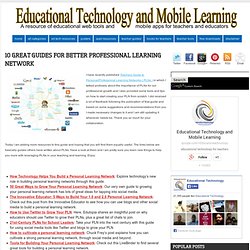
I did received a lot of feedback following the publication of that guide and based on some suggestions and recommendations from you I made necessary changes to it and I am still updating it whenever needs be. Thank you so much for your collaboration. Today I am adding more resources to this guide and hoping that you will find them equally useful.
The links below are basically guides others have written about PLNs. Thoughts from a MOOC Pioneer — Academic Technology. A screen capture from Scott E.
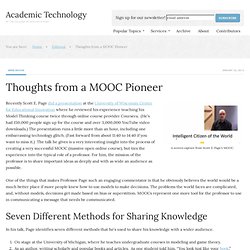
Page’s MOOC. Recently Scott E. Page did a presentation at the University of Wisconsin Center for Educational Innovation where he reviewed his experience teaching his Model Thinking course twice through online course provider Coursera. MOOCs are your friends. Online courses need human element to educate. Online courses are proliferating, says Douglas Rushkoff, but will really succeed when they bring humanity to learning process Douglas Rushkoff: Education is under threat, but online computer courses are not to blameHe says education's value hard to measure; is it for making money or being engaged?
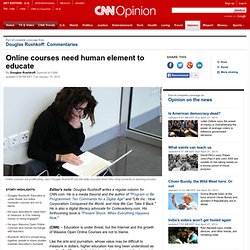
He says Massive Open Online Courses lack human exchange with teachersRushkoff: MOOCs should bring together people to share studies, maintain education's humanity. Three higher education trends to watch for in 2013. International higher education by its very nature sits at an intersection of socio-cultural, economic and geopolitical variables.
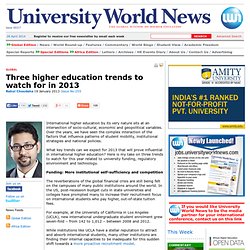
Over the years, we have seen the complex interaction of the factors that influence patterns of student mobility, institutional strategies and national policies. What key trends can we expect for 2013 that will prove influential in international higher education? Here is my take on three trends to watch for this year related to university funding, regulatory environment and technology.
The Learning Technologist Becomes A Luddite. Norma sent a link to The End of the University as We Know It, by Nathan Harden and in her subject line said, "Interesting Article.
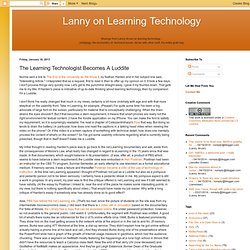
" I interpreted that as a request, first to read it, then to offer up my opinion on it. Student cliff – 7 reasons for plummeting student numbers. Lots of angst has appeared around what is now being dubbed the ‘student cliff’.
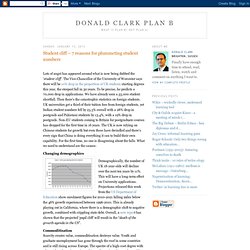
The Vice-Chancellor of the University of Worcester says there will be 10% drop in the proportion of UK students starting degrees this year, the steepest fall in 30 years. To be precise, he predicts a 70,000 drop in applications. We have already seen a 53,000 student shortfall. Then there's the catastrophic statistics on foreign students. UK universities get a third of their tuition fees from foreign students, yet Indian student numbers fell by 23.5% overall with a 28% drop in postgrads and Pakistani students by 13.4%, with a 19% drop in postgrads.
Coursera's fee-based course option. Coursera will offer a fee-based pathway with identity verification for students who want to earn a more meaningful certificate of completion, the company said today in an announcement that also sheds light on an emerging business model for the largest massive open online course (MOOC) provider.
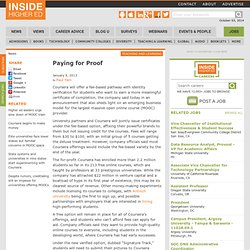
University partners and Coursera will jointly issue certificates under the fee-based option, affixing their powerful brands to them but not issuing credit for the courses. Fees will range from $30 to $100, with an initial group of 5 courses getting the deluxe treatment. Predictions about higher ed technology in 2013 (essay) Those reading this column or any of its annual predecessors (in 2012, 2011, 2010, or 2009) are invited to reflect that the historic challenges facing universities and colleges are less related to technological disruption or market evolution and more causally related to self-induced bruising, glacial cycles of adaptation, and torturous processes that pass for decision-making.
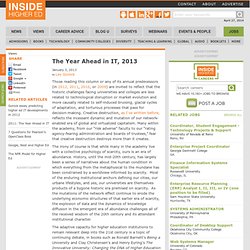
Creative destruction, as I've written before, reflects the incessant dynamic and mutation of our network-enabled era of global and virtualized capitalism. Free education: Learning new lessons. TOP-QUALITY teaching, stringent admissions criteria and impressive qualifications allow the world’s best universities to charge mega-fees: over $50,000 for a year of undergraduate study at Harvard.
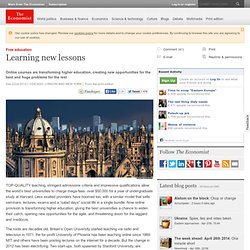
Less exalted providers have boomed too, with a similar model that sells seminars, lectures, exams and a “salad days” social life in a single bundle. Now online provision is transforming higher education, giving the best universities a chance to widen their catch, opening new opportunities for the agile, and threatening doom for the laggard and mediocre. The roots are decades old. The End of the University as We Know It - Nathan Harden. In fifty years, if not much sooner, half of the roughly 4,500 colleges and universities now operating in the United States will have ceased to exist.
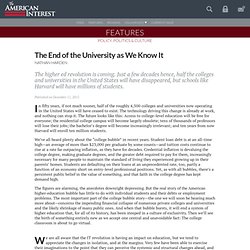
The technology driving this change is already at work, and nothing can stop it. The future looks like this: Access to college-level education will be free for everyone; the residential college campus will become largely obsolete; tens of thousands of professors will lose their jobs; the bachelor’s degree will become increasingly irrelevant; and ten years from now Harvard will enroll ten million students. Open University launches British Mooc platform to rival US providers. A UK-based platform for massive open online courses (Moocs) to rival established providers in the US has been launched by The Open University. Futurelearn will carry courses from 12 UK institutions (see list), which will be available to students across the world free of charge. It will follow in the footsteps of US providers including Coursera, edX and Udacity, which offer around 230 Moocs from around 40 mostly US-based institutions to more than 3 million students.
This could be huge... Moocs are already big - in reach and in hype - and are predicted to explode. Zoë Corbyn checks in to learn if they are more than just a novelty and to find out what it’s like to teach a class of 38,000 Kristin Sainani, clinical assistant professor in health policy at Stanford University, has just finished teaching her most popular course ever. The MOOC movement is not an indicator of educational evolution. Top Ed-Tech Trends of 2012: MOOCs. Part 5 of my Top Ed-Tech Trends of 2012 series The Year of the MOOC Massive Open Online Courses. MOOCs.
MOOCs in 2012: Dismantling the Status Quo. The dominant story in higher education for 2012 was clearly the rise of Massive Open Online Courses (MOOCs), particularly the xMOOCs such as Coursera, Udacity, and edX. MOOCs and Pedagogy: Teacher-Centered, Student-Centered, and Hybrids. In writing about all of the hype surrounding MOOCs, I saw this photo entitled “University Classroom of the Future.” From instructional television in the 1950s through updated versions of “distance education, “a professor professing in front of a camera is familiar and surely will dominate many of the newly established platforms (e.g., Coursera, Udacity, edX). Whether it will be the “University Classroom of the Future,” I cannot say for sure. But the photo makes the professor front and center in teaching content and skills.
Online learning in 2012: a retrospective. The Future of Learning, Networked Society - Ericsson. Why I Gave Up Flipped Instruction. » Napster, Udacity, and the Academy Clay Shirky. Fifteen years ago, a research group called The Fraunhofer Institute announced a new digital format for compressing movie files. Clay Shirky is our MP3. Dear Clay, Please stop being wrong about the future of Higher Education. Facebook groups as LMS: A case study.